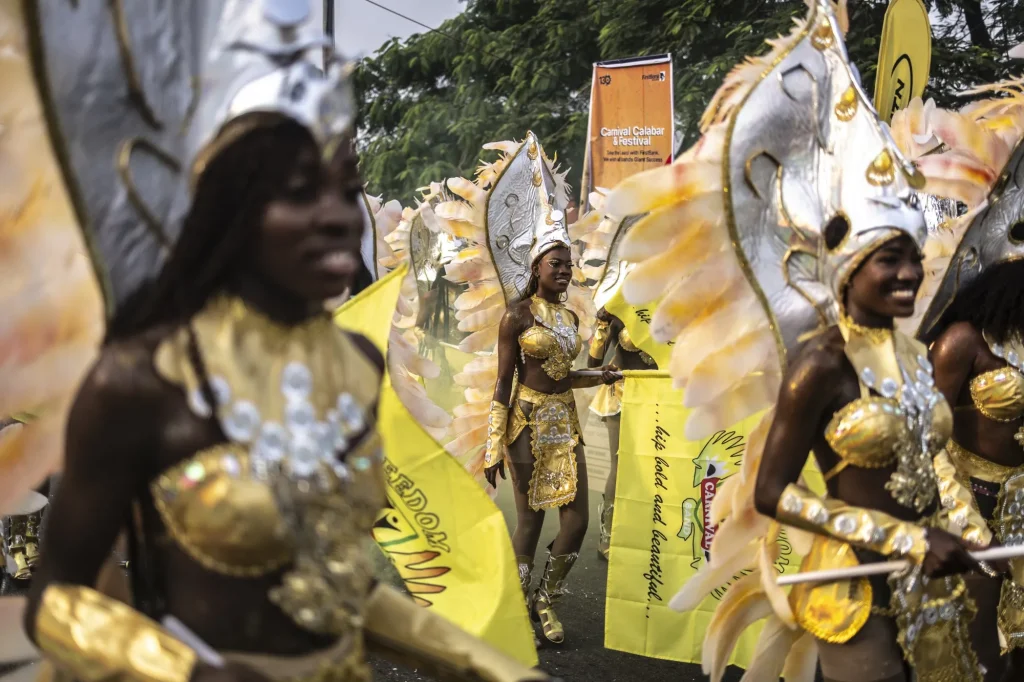Culture Festival in Calabar: An Itinerary of Cultural and Tourist Experiences

Discover the Rich Culture and Traditions of Calabar
Situated in southeastern Nigeria, Calabar is celebrated as a vibrant hub of culture and history. Dubbed the “Cultural Capital of Nigeria,” the city seamlessly blends its ancient traditions with contemporary artistry, making it a must-visit destination for both local and international tourists. One of the standout events that encapsulate this essence is the annual Calabar Culture Festival, a grand celebration that draws thousands eager to engage with the city’s rich heritage and artistic expressions.
The festival, which typically spans several days, showcases a plethora of attractions and activities that highlight the region’s diversity, attracting participants of all ages. Some notable highlights of the festival include:
- Traditional Dance Performances: Local dance troupes captivate audiences with their mesmerizing performances that reflect the rhythm and vitality of Calabar’s rich ethnic traditions. From the energetic Ekombi dance of the Efik people to the enchanting Calabar Carnival, these performances tell stories of love, war, and celebration through intricate movements.
- Art Exhibitions: Visitors can immerse themselves in visual storytelling as talented local artists unveil their masterpieces. These exhibitions often feature a blend of traditional and contemporary art, showcasing not only the history of the region but also the advanced skills of local artists. Expect to see vibrant paintings, sculptures, and crafts that tell the story of Calabar’s past and present.
- Food Fair: Experience a tantalizing journey through Calabar’s cuisine, known for its unique flavors that reflect its rich cultural heritage. From the famous “Edikang Ikong” (a hearty vegetable soup) to “bitterleaf soup” and the mouthwatering “Ngwo” (smoked catfish), food enthusiasts will revel in the tasty offerings. Street vendors and local restaurateurs come together to present a culinary smorgasbord that highlights indigenous flavors and cooking styles.
The festival also serves as a vibrant platform for cultural exchange, promoting the synergy of art, music, and traditions. Visitors have the opportunity to stroll through local markets, which are bustling with handcrafted goods, textiles, and unique souvenirs that embody the spirit of Calabar. Items such as traditional beadwork, woven baskets, and colorful clothing provide a tangible connection to the community’s artistic legacy.
As you navigate through the bustling streets brimming with life during the festival, prepare to be enveloped in a colorful atmosphere filled with laughter, music, and communal joy. Such experiences not only deepen your understanding of Calabar’s intricate history but also invite you to partake in its vibrant cultural narrative. Whether you’re dancing alongside locals, sampling tantalizing dishes, or simply soaking in the atmosphere, the annual festival is an enthralling celebration that truly encapsulates the heart and soul of Calabar.
CHECK OUT: Click here to explore more

A Journey Through the Festival: Activities and Attractions
The Calabar Culture Festival is a multifaceted event that invites participants to dive deep into a tapestry of experiences designed to celebrate the essence of Calabar’s diverse heritage. With each passing year, this festival evolves, featuring both time-honored traditions and innovative expressions of contemporary culture. As you plan your itinerary, consider the rich array of activities you can partake in during this vibrant celebration.
One of the festival’s cornerstone attractions is the majestic Calabar Carnival, which takes place on the final day of the festival. This grand parade showcases an explosion of color, as various groups representing different ethnic communities come together to display their artistry through elaborate costumes and dance. The streets are alive with pulsating music, and the spectacle is nothing short of exhilarating. The carnival parade not only captivates the eyes but also serves as a window into the cultural history of each participating group.
Cultural Workshops and Community Engagement
Beyond the visual splendor, the festival offers engaging cultural workshops where visitors can learn from artisans and practitioners skilled in traditional crafts. From bead-making to textile weaving, these hands-on experiences provide an authentic insight into local craftsmanship. This direct interaction fosters a deeper appreciation for the creative techniques passed down through generations, allowing festival-goers to take home not just memories but also tangible skills.
In addition to workshops, the festival features a series of cultural talks and seminars. These discussions often highlight topics such as the history of the Efik people, the significance of local traditions, and the role of cultural preservation in modern society. Knowledgeable speakers, including historians and community leaders, gather to share their insights, encouraging audience participation and engagement. It is a remarkable opportunity for tourists to connect intellectually with Calabar’s rich narrative.
Family-Friendly Activities
The Calabar Culture Festival is designed to cater to audiences of all ages, seamlessly blending entertainment with educational experiences. Families can explore dedicated areas with activities specifically designed for children, including storytelling sessions where local elders share traditional tales that have shaped the community’s identity for decades. Face painting and crafting stations allow children to express their creativity, making it easy for families to spend quality time together in an inspiring environment.
Additionally, the festival features a variety of recreational activities ranging from sporting events to talent shows. These events often showcase local talents, such as musicians, poets, and performers, who contribute to the festival’s lively atmosphere. Whether you are a sports enthusiast, an art lover, or simply seeking a lively day out with your family, the Calabar Culture Festival offers a plethora of opportunities to engage meaningfully with the festivities.
With an assortment of activities designed to showcase the essence of Calabar, the Calabar Culture Festival is more than just an event; it is an exploration of identity, creativity, and communal spirit. As you prepare for your visit, be ready to immerse yourself in the culture, learn from the locals, and experience the joy that comes from the celebration of life and heritage in Calabar.
| Experience | Details |
|---|---|
| Cultural Performances | Immerse yourself in the vibrancy of traditional and contemporary dance, music, and drama. |
| Local Cuisine | Explore delectable dishes that reflect rich cultural heritage, offering visitors a unique culinary journey. |
| Arts and Crafts | Shop for traditional artifacts and stunning visual art pieces, supporting local artisans. |
| Historical Tours | Discover Calabar’s rich history through engaging guided tours of key historical landmarks. |
The “Culture Festival in Calabar” is a fantastic opportunity to delve into the vibrant customs and artistic expressions of Nigerian society. Attendees can enjoy cultural performances showcasing local dance and music traditions, providing a thrilling glimpse into community spirit. Meanwhile, food enthusiasts can partake in sampling various local cuisines that convey the rich flavors of the region, promising a gastronomical delight. Additionally, the festival emphasizes the importance of arts and crafts, with numerous opportunities to purchase unique handmade items, reflecting the creativity of local artisans. Historical tours become a part of the experience, allowing visitors to appreciate Calabar’s past while connecting with its present. Come discover the enriching layers of culture and heritage at this lively festival.
YOU MAY ALSO LIKE: Read read another article
Gastronomic Delights: A Taste of Calabar
No cultural celebration would be complete without the opportunity to explore local cuisine, and the Calabar Culture Festival is no exception. Gastronomy is an integral part of the festival, showcasing the flavorful dishes that define the Efik culture. Festival-goers can savor local delicacies at various food stalls offering fragrant pepper soup, rich jollof rice, and the ever-popular ofada rice served with flavorful sauce – each meal steeped in history and tradition.
One of the most significant attractions is the Culinary Exhibition, where renowned chefs and local home cooks demonstrate their culinary skills. Participants can witness live cooking sessions showcasing traditional recipes passed down through generations. Visitors are encouraged to join in, offering a unique hands-on opportunity to learn how to prepare dishes like ekpang nkwukor and nsala soup. This interactive experience not only satisfies the taste buds but also promotes cultural appreciation through food.
Marketplace of Culture: Souvenirs and Artisan Crafts
The festival also features an impressive craft market where artisans display their handmade goods. From beautifully woven baskets to stunning bead jewelry, visitors can find unique souvenirs that embody the essence of Calabar. The market is designed to support local craftsmanship, ensuring that the community benefits from the festival’s economic impact.
As you wander through the market, admire the intricacies of local artworks and take the opportunity to engage with the artisans themselves. This direct connection provides valuable insight into the stories and techniques behind each creation, presenting an authentic experience that showcases the true spirit of Calabar’s artistic heritage.
Nightlife and Entertainment: Keeping the Spirit Alive
The Calabar Culture Festival extends well into the night, where vibrant nightlife events bring the festival to life in a new way. Unmissable concerts feature local and national artists who bring infectious rhythms and melodies that compel even the most reluctant attendees to join in the festivities. Dance troupes often take the stage, demonstrating traditional and contemporary dance forms that resonate deep within the community.
One of the anticipated events is the Cultural Night, where various groups perform their dances and songs in a dazzling display of talent and energy. This evening event captivates audiences under the moonlit skies, allowing participants to immerse themselves in the soundscape of their surroundings.
Exploration Beyond the Festival: Cultural Landmarks and Eco-Tourism
<pWhile enjoying the festival itself, it’s worth taking time to explore the cultural landmarks surrounding Calabar. Sites such as the Calabar Slave History Museum and the National Museum of Calabar offer profound insights into the historical significance of the region, while embracing the narratives of resilience and heritage.
For nature lovers, the nearby Calabar River provides scenic views and opportunities for eco-tourism. Boat rides along the river are a delightful way to experience the natural beauty of the area, and you might even catch glimpses of local wildlife. Many tour operators offer packages that include visits to breathtaking natural reserves, where visitors can enjoy hiking, bird watching, and exploring the lush surroundings.
With a blend of cultural immersion and adventure awaiting every corner, the Calabar Culture Festival is a celebration that expertly intertwines the past and present, providing an itinerary filled with rich experiences for all who attend.
YOU MAY ALSO LIKE: Read read another article
Conclusion: An Unforgettable Cultural Journey Awaits
The Calabar Culture Festival stands as a testament to the vibrant spirit of Nigeria, offering an unparalleled itinerary filled with cultural richness and diverse tourist experiences. From the tantalizing flavors of local dishes that highlight the Efik heritage to the captivating performances at cultural night events, each aspect of the festival invites attendees to delve into the heart of Calabar’s unique identity.
As you explore the bustling craft market, it becomes evident that the festival is not just a celebration but also a profound commitment to preserving and promoting local artistry. Visitors have the opportunity to take home not just souvenirs, but pieces of culture intertwined with the stories of skilled artisans. Moreover, the chance to witness culinary demonstrations enriches this experience, enabling festival-goers to connect with traditional cooking methods that celebrate generations of culinary prowess.
Beyond the festival grounds, Calabar beckons with its historical landmarks and stunning natural beauty. By visiting sites like the Calabar Slave History Museum, you will gain an understanding of the region’s complex past, while eco-tourism activities such as boat rides along the Calabar River provide tranquility and a connection to nature.
In summary, the Calabar Culture Festival not only celebrates the traditions of the past but also nurtures cultural exchange and tourism, making it a must-visit event for anyone seeking to experience the best of Nigerian culture. Whether you are a local or a visitor, the festival promises unforgettable memories and moments of connection that resonate long after the final performance. Plan your trip now and immerse yourself in the majesty of Calabar, where every experience tells a story worth exploring.


